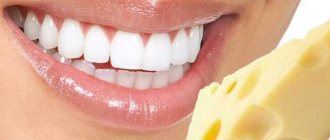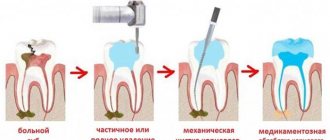It is no secret that calcium is necessary for the formation of bone and dental tissue. In this regard, a completely logical question arises: is it possible to consume additional calcium to strengthen teeth? Dentists unanimously state that during the formation of teeth (and this is during childhood), this macronutrient is extremely necessary, but in adults calcium will not be able to improve their condition. To strengthen tooth enamel, special dental procedures are recommended for adults. In St. Petersburg they are carried out by specialists from Nurimed dentistry. You can make an appointment with a doctor by calling.
What calcium to buy to strengthen bones.
October 12, 2021
11654
5
2
Content
- Forms of calcium
- How to choose a calcium supplement
- How to take calcium tablets
- Top 10 calcium supplements
- Calcium-D3 Nycomed Forte
- Now Foods, Calcium Hydroxyapatite
- Calcemin Advance
- Doppelhertz Active Magnesium+Calcium+D3
- Calcium D3 Ultra
- Solgar Calcium-Magnesium with Vitamin D3
- Calcium-Active Citrate
- Mountain calcium D3
- Complivit Calcium D3 Forte
- Calcium gluconate
- Foods High in Calcium
Calcium is a very important macronutrient, without which the body cannot function properly. Calcium is not only about strong bones and teeth. It is also responsible for muscle contraction, blood clotting, heart and vascular health, and the functioning of the nervous system.
To get your daily calcium requirement (about 1,000 mg) from food, you should drink a glass of milk, a glass of plain yogurt, and eat a block of cheddar cheese. But you can take a simpler route - and just buy calcium tablets. But here it is important to choose a drug that will be well absorbed by the body. These are the products on our list of the best calcium supplements.
Read also Vitamins for hair loss: 10 of the best Review of the best vitamins for hair.
Calcium: an element essential for the body
Osteoporosis To reduce the risk of developing osteoporosis, preparations with calcium and vitamin D3, which promote the absorption of the mineral, can be used. More details
Dental health Calcium is involved in strengthening tooth enamel, which protects teeth from caries. Benefits of calcium
Healthy nails and hair Calcium and vitamin D3 promote the growth of strong hair and nails, thereby helping to maintain natural beauty and health. Medicine with calcium and vitamin D3
The role of calcium in the body Calcium is involved in the formation of bones, in the functioning of muscles and the blood coagulation system, and in the regulation of nerve conduction. What other processes require calcium?
Symptoms of calcium deficiency Lack of calcium in the body negatively affects the condition of bones, teeth, hair and nails. How can you make up for the deficiency?
"Complivit® Calcium D3 Forte" Calcium and vitamin D3 for strong bones and teeth. Find out more There are contraindications. It is necessary to obtain specialist advice.
Calcium is an important macronutrient found in all cells of the human body. A deficiency or excess of the mineral can have a detrimental effect on metabolic processes and the functioning of internal organs. The functions of calcium in the body are diverse: from participation in muscle contraction to bone formation. In the article, we’ll talk in more detail about the role calcium plays in the human body, how to maintain normal levels of the mineral, and why calcium supplements can be prescribed.
Most of the macroelement - approximately 99% - is found in the structure of bone and joint tissues, the remaining 1% is concentrated in the blood [1]. What effect does calcium have on the human body?
Calcium for bones
It is necessary to maintain a sufficient amount of calcium in the body to strengthen bones, build their strong and strong structure, resistant to high loads and minor trauma.
Probably everyone knows that calcium is important for normal growth and proper skeletal formation in children: a child needs calcium throughout the entire period of development[2]. To be more precise, a macronutrient is necessary for people of all ages: sufficient calcium intake is an important condition for healthy and strong bones. In addition, the mineral not only strengthens the spine, but also helps maintain an even and correct posture.
A lack of calcium affects a person’s well-being: he or she develops weakness and back pain. According to methodological recommendations, deficiency of the element can lead to demineralization of the spine, pelvic bones and lower extremities[3], which increases the risk of developing diseases of the musculoskeletal system, such as osteomalacia, osteoporosis, osteochondrosis. Also among the consequences of calcium deficiency are scoliosis and poor posture, and in children - growth retardation and rickets.
Calcium for teeth
Calcium is needed not only for bones, but also for teeth. The mineral is involved in the formation of dentin (the main part of the tooth) and tooth enamel and helps protect teeth from caries. Dental health directly depends on calcium. In children with a reduced level of the element in the body, delayed teething and dystrophic changes in the enamel may be observed. Calcium deficiency in adults increases the risk of developing caries and enamel erosion.
Important
Caries is one of the most common diseases of the oral cavity[4]. According to WHO, almost 100% of the adult population of Europe has encountered this problem at least once in their lives[5]. Demineralization of teeth - that is, a condition in which dental tissues lose a significant amount of minerals, in particular calcium salts - leads to disruption of the enamel structure, its weakening and, as a consequence, the development of caries [6].
Calcium for hair
The beauty and health of hair largely depends on calcium. The mineral affects the functioning of the hair follicle[7]. And healthy roots are one of the decisive factors for normal hair growth. Being a structural element (contained in the shaft), calcium affects the condition of the hair: with its deficiency, hair loss[8] and deterioration of their condition are observed.
Calcium for nails
The strength, hardness, shine, uniformity and uniformity of color of the nail can all depend on the level of calcium in the horny cells of the nail[9]. With a significant deficiency of the element, the nails usually become brittle, dull, and the plate may peel off[10]. Thus, calcium, among other things, is necessary for strengthening nails.
Thus, calcium is necessary to maintain normal functioning of the entire body. To avoid the development of deficiency conditions, it is necessary to monitor the level of the mineral. The average daily intake of calcium directly depends on a person’s age (see table).
Table . Daily norm of the macronutrient calcium for people of different ages[11].
| Age | Daily calcium intake, mg |
| Up to 3 months | 400 |
| 4–6 months | 500 |
| 0.5–1 year | 600 |
| 1–3 years | 800 |
| 3–7 years | 900 |
| 7–11 years | 1100 |
| 11–18 years old | 1200 |
| 18–59 years old | 1000 |
| 60 years | 1200 |
According to the norms of physiological needs for energy and nutrients for various groups of the population of the Russian Federation [12], the upper permissible level of calcium intake is 2500 mg/day. However, a surplus of an element is still less common than a deficiency. Most often, a lack of the mineral is observed in children, the elderly, adherents of strict diets, pregnant women and women during lactation.
The main source of calcium is various foods: dairy products (milk, cottage cheese, cheese), sesame seeds, pistachios, legumes, greens, sea fish[13,14]. But even people who follow all the recommendations of nutritionists and include calcium-rich foods in their diet may experience a decrease in the level of the mineral. In this case, according to the clinical recommendations of the Ministry of Health, taking special calcium supplements may be indicated to meet the daily requirement for the element[15].
As numerous studies show, calcium levels are affected by the content of calciferol in the body. Vitamin D increases the absorption of the mineral and maintains normal calcium levels in the blood[16]. Therefore, it is better to take calcium along with vitamin D. But which calcium supplement is better to choose?
The pharmacological market offers a wide selection of vitamin and mineral complexes with calcium and vitamin D. These can be not only biologically active substances, but also medications. The difference between these groups is that to register a dietary supplement, it is not necessary to undergo testing for the effectiveness of the drug - it is enough to prove its safety. Supplements are not indicated for the treatment of deficiency conditions, however, for preventive purposes they can be used along with medications. A doctor will help you make a choice in favor of any dietary supplements or medications: taking into account the health characteristics of a particular person, a specialist can choose the most suitable remedy.
However, those who are completely far from medicine should also understand the features of calcium preparations. When purchasing, you need to pay attention to the composition, indications and contraindications, duration of the course and its cost. Taking these criteria into account, we will consider some popular dietary supplements and medicines with calcium.
- “Calcium-D3 Nycomed Forte”[17]. This drug (certificate number in the GRLS is P N013355/01 [18]) is indicated for the treatment and prevention of calcium and vitamin D3 deficiency. The active ingredients are calcium carbonate and colecalciferol. The drug can be used not only in adults, but also in children from the age of three. Not recommended for children under three years of age, people with high levels of calcium and vitamin D, severe renal failure, intolerance to the components of the product, and in some other cases. The duration of the course is at least four to six weeks. For an adult, one package of 60 tablets costing about 440 rubles may be enough for a four-week course. For longer-term use, it is more profitable to purchase a large pack of 120 tablets; its cost is approximately 615 rubles[19].
- Solgar® Calcium 600[20]. This dietary supplement can be used as an additional source of calcium and vitamin D3, they are the active ingredients of the supplement. "Calcium 600" is not suitable for people with intolerance to the components, as well as for children. Pregnant and lactating women must obtain a doctor's permission before use. The manufacturer does not specify how long the IUD should be taken. The cost of a package with 60 tablets starts from 710 rubles[21].
- Calcemin®. This medicine (number in GRLS - P N015890/01[22]) is a whole vitamin and mineral complex. In addition to calcium and vitamin D3, it contains zinc, copper, manganese and boron. This medicine is indicated to compensate for the deficiency of these nutrients. Calcemin® is not suitable for children under five years of age, people with hypersensitivity to the components of the product, with high levels of calcium or vitamin D3, as well as in other cases - more details can be found in the instructions for medical use. The minimum course is two to three months. Adults are recommended to take two tablets per day. Then to take the product for two months you will need at least 120 tablets. A package with this number of tablets will cost from 710 rubles[23].
The benefits of calcium for the body are undeniable: all cells and, accordingly, all biological processes depend on this mineral. Unfortunately, symptoms of calcium deficiency often become noticeable only when there are significant deviations from the norm. Therefore, it is extremely important to monitor the macronutrient content in the body, undergo appropriate tests and, if necessary, take preventive measures. In addition, it is worth choosing products that include, in addition to calcium, colecalciferol, or vitamin D3.
Calcium and vitamin D3 preparation for adults and children from 3 years of age
“Complivit® Calcium D3 Forte” is another version of the drug with calcium and vitamin D3[24].
Contains 500 mg of calcium and 400 IU of vitamin D3 in 1 tablet. The drug was created to regulate the exchange of calcium and phosphorus in the body (bones, teeth, nails, hair, muscles), increase bone density, replenish the lack of calcium and vitamin D3 in the body, promote the mineralization of bone and dental tissue.
Indications for use:
Prevention and complex therapy of osteoporosis and its complications (bone fractures). Prevention and treatment of calcium and/or vitamin D3 deficiency.
Contraindications to taking the drug include age under 3 years, hypersensitivity to components, increased concentration of calcium in the blood or urine, nephrolithiasis, excess vitamin D. Other contraindications can be found in the instructions for medical use of the drug.
To combat calcium and vitamin D3 deficiency, adults and children over 12 years old – 2 tablets per day, children 3-12 years old – 1 tablet per day or as prescribed by a specialist. Taking the drug "Complivit® Calcium D3 Forte" should only be done after consultation with a specialist. Typically, the course takes about 4–6 weeks. But the exact dosage and duration of therapy should be determined by a specialist. The average retail price of a package of Complivit® Calcium D3 Forte (60 tablets) is 389 rubles[25].
Sources:
- 1https://umedp.ru/articles/rol_kaltsiya_v_profilaktike_i_lechenii_osteoporoza.html
- 2https://myvrachi.ru/sites/default/files/publications/9578/pdf/zachem_nuzhny_preparaty_kalciya_detyam_i_beremennym_zhenshchinam.pdf
- 3,11,12https://www.rospotrebnadzor.ru/documents/details.php?ELEMENT_ID=4583
- 4https://www.who.int/ru/news-room/fact-sheets/detail/oral-health
- 5https://www.euro.who.int/__data/assets/pdf_file/0003/365862/oral-health-2018-rus.pdf
- 6https://ru.wikipedia.org/wiki/Dental_caries#Stain_stage_(macula_cariosa)
- 7https://medical-diss.com/medicina/optimizatsiya-terapii-diffuznoy-alopetsii-i-onihodistrofii-na-osnovanii-izucheniya-obmena-kaltsiya
- 8https://bme.org/index.php/CALCIUM
- 9https://www.rmj.ru/articles/dermatologiya/Znachenie_kalyciya_dlya_zdorovyya_koghi_volos_i_nogtey_i_voprosy_racionalynoy_korrekcii_ego_potrebleniya/
- 10https://12gp.by/information/news-and-announcements/document-249093.html
- 13https://rsport.ria.ru/20201008/kaltsiy-1578898639.html
- 14https://cgon.rospotrebnadzor.ru/content/62/4191
- 15,16https://minzdrav.gov-murman.ru/documents/poryadki-okazaniya-meditsinskoy-pomoshchi/D%2019042014.pdf
- 17https://calciumd3.ru/
- 18https://grls.rosminzdrav.ru/Grls_View_v2.aspx?routingGuid=3e8d4b33-ca9e-4fcd-919a-2e81d71f3fc0&t=
- 19https://vseapteki.ru/product/104968-kaltsiy_d3_nikomed_forte/
- 20https://solgarvitamin.ru/product/calcium-600/0415
- 21https://vseapteki.ru/search/?query=Solgar%20calcium%20600%20from%20shells%20oysters&original=1
- 22https://grls.rosminzdrav.ru/Grls_View_v2.aspx?routingGuid=9b979932-e2d4-49a1-a375-67fcd74594fb&t=
- 23https://vseapteki.ru/search/?query=calcemin
- 24According to the Instructions for medical use of the drug “Complivit® Calcium D3 Forte”
- 25According to ALPHARM LLC, January–March, 2021.
All information related to health and medicine is presented for informational purposes only and is not a reason for self-diagnosis or self-medication.
Forms of calcium
Calcium in preparations is presented in the form of various compounds. Let's talk about them in more detail.
- Calcium citrate.
Most often, such calcium costs an order of magnitude more than other calcium preparations. And all because calcium citrate is maximally absorbed by the body (even if there are problems with the gastrointestinal tract). This form of the drug is ideal for people over 60 years of age. - Calcium phosphate.
This form of calcium has good bioavailability. Calcium phosphate, unlike other compounds, does not cause constipation. This calcium is usually prescribed to those who are prone to such problems. - Calcium chelate.
This calcium is absorbed by the body by 90-98%, it is enriched with amino acids, is well tolerated, does not disturb the acid balance and is quickly absorbed by the body. - Calcium hydroxyapatite.
This form of calcium is obtained from animal sources. Calcium hydroxyapatite is often enriched with collagen and phosphorus, making it ideal for strengthening bones and teeth. - Calcium carbonate.
The cheapest and most common type of calcium. Its maximum digestibility is 22%. But if a person has low acidity, such calcium is not absorbed at all. Moreover, excess calcium can simply be deposited in the kidneys. Calcium carbonate has good bioavailability, plus the issue of price is important, so people often buy it.
How to choose a calcium supplement
Many factors influence how calcium is absorbed in the body. Let's look at the main ones.
- Associated health problems.
If you are over 60 years old or have gastrointestinal diseases, we recommend choosing calcium citrate preparations. If a person has a tendency to constipation, it is better to buy calcium phosphate. For older people (especially if there is coronary heart disease or congestive heart failure), calcium enriched with magnesium and potassium is suitable (but first consult a doctor). For anemia, it is better to choose Calcemin Advance (it does not affect the absorption of iron, like other calcium preparations). - Lifestyle and nutritional habits.
Most people today are deficient in vitamin D, which is produced by exposure to the sun and found in fish. This vitamin is necessary for the absorption of calcium and phosphorus. Therefore, if you suspect you have a vitamin D deficiency, choose calcium supplements fortified with it. - Tendency to allergies.
Before taking any vitamins and minerals (including calcium supplements), be sure to consult your doctor. An allergy can be either to the main component of the drug or to auxiliary components. - Age.
Be sure to read the instructions before purchasing calcium to understand at what age a particular drug should be taken. By the way, many tablets cannot be broken, but taken only whole - this also needs to be taken into account.
IMPORTANT!
Any calcium supplements should not be taken with milk. Milk dissolves the tablet shell, and the active substance is quickly destroyed by stomach acid.
What's best to eat for your teeth?
There are a number of products that can be called truly beneficial for teeth
: - dairy products (cheese, cottage cheese, yogurt) - sources of calcium; - eggs (chicken, quail) - contain vitamin D, necessary for the absorption of calcium; - seafood (fish, shrimp) - contain phosphorus and fluorides; - hard vegetables and fruits (carrots, apples, cucumbers) - intense chewing helps to increase salivation and mechanically clean the teeth; - greens (parsley, onion) - their juice has antibacterial properties; - green and black tea - contain fluorides and have a bactericidal effect.
How to take calcium tablets
It is better to take calcium supplements with meals, since fats, proteins and bile acids are necessary for the absorption of the macroelement. It is also important to take into account circadian (daily) rhythms. The body has a hormone responsible for calcium metabolism - its maximum concentration is observed in the afternoon.
It is better to divide the daily calcium intake into two doses, because 600-1000 mg of calcium at one time will not be absorbed. You need to take calcium with enough water (one glass).
If you are taking antibiotics from the tetracycline group, the break between the antibiotic and calcium should be at least three hours, because they bind to each other and neutralize each other's effects.
If you are taking diuretics, monitor your blood creatinine and calcium levels at least once a month.
You should not take calcium if:
- tendency to thrombosis;
- severe atherosclerosis;
- hypercalciuria (metabolic problem when there is an excess of calcium in the urine);
- atrial fibrillation;
- sarcoidosis;
- multiple myeloma;
- metastases in the bones or spine;
- active form of tuberculosis;
- gout
Calcium supplements are prescribed very carefully to patients with uncontrolled hypertension, severe coronary heart disease, renal and liver failure.
Read also Top 5 non-hormonal drugs for menopause Non-hormonal drugs for menopause.
Lack of calcium in the body in pregnant women
Lack of calcium in pregnant women manifests itself in the form of the symptoms described above. There is no scientifically confirmed evidence that during pregnancy calcium is “washed out” and used to form the fetus from the teeth. However, in addition to the fact that the lack of a macronutrient threatens a woman’s health, it also increases the risk of caries in a child in the future. Studies have shown that children of women who received sufficient amounts of this macronutrient during pregnancy were less likely to suffer from caries.
The required daily calcium intake for pregnant women is needed not in order to preserve their teeth, but in order to provide the required supply of macronutrients to the unborn child. The same applies to the period of feeding the baby.
Knowing how important calcium is for teeth, try to adhere to a healthy lifestyle and maintain the recommended balance of vitamins, macro- and microelements in your diet for your age. To maintain your smile, see your dentist at least twice a year.
Calcium-D3 Nycomed Forte
This calcium supplement can easily be called one of the most popular in Russia. “Calcium D3 Nycomed Forte” is sold in the form of chewable tablets (1 tablet contains 500 mg of pure calcium and 400 IU of vitamin D3). Doctors recommend taking 2-3 calcium tablets per day. At first glance, it may seem that Calcium D3 Nycomed Forte contains too much vitamin D (compared to other drugs), but the daily dose of this vitamin is from 800 to 1200 mg. Among the undeniable advantages of this drug are the high calcium content and the presence of vitamin D. There is one minus - the price is not entirely affordable.
Calcium-D3 Nycomed Forte
Takeda Pharmaceutical Company, Japan
Calcium-D3 Nycomed Forte is a combination drug that regulates the metabolism of calcium and phosphorus.
Replenishes the lack of calcium and vitamin D3 in the body, which is required for the mineralization of teeth. Calcium takes part in the formation of bone tissue, mineralization of teeth, blood clotting, regulation of nerve conduction processes and muscle contractions, and maintaining stable nervous activity. from 223
5.0 1 review
698
- Like
- Write a review
Usage rate
Throughout a person’s life, the required amount of calcium changes:
- Infants under 6 months need 200 mg daily.
- Children from 7 months to one year need 260 mg per day.
- Between the ages of one and three years, a child needs 700 mg.
- Children from 4 to 8 years old need 1000 mg of the macronutrient daily.
- A maximum dose of 1300 mg/day is needed for ages 9-18 years.
- Women aged 19 to 50 years need 1000 mg of calcium per day.
- Men aged 19 to 70 years need 1000 mg per day.
- Women aged 51 years and older need 1200 mg daily.
- Men 71 years of age and older require 1,200 mg of calcium per day.
The greatest amount of calcium is needed by a person in childhood and adolescence, when permanent teeth appear. This is due to the fact that the macroelement accumulates in the teeth only during their formation. And the further condition of the teeth depends on how much this supply is replenished. Unfortunately, it will not be possible to influence the health of molars by consuming calcium-containing foods.
Now Foods, Calcium Hydroxyapatite
This is an American calcium preparation of animal origin, which means it is ideal for strengthening teeth (97% of our tooth enamel is calcium). Now Foods are powder capsules. This form of release allows you to protect calcium from the aggressive influence of the gastric environment, so calcium is absorbed almost completely. You can take Now Foods calcium from the age of 18, it reduces the amount of plaque on your teeth, makes them smoother, enamel defects become less noticeable, and the likelihood of developing caries is reduced.
Now Foods Calcium Hydroxyapatite
Now Foods, USA
Calcium hydroxyapatite contains macroelements, which is a balanced mixture of minerals necessary for the body.
92
- Like
- Write a review
Calcemin Advance
Another calcium tablet made in the USA, which contains all the substances necessary for healthy bones. "Calcemin Advance" is suitable for women during menopause, the form of the drug is calcium citrate and calcium carbonate. Tablets are prescribed from the age of 12. This drug not only maintains the necessary level of calcium in the body, but also prevents it from being washed out of the bones. And all - thanks to the fact that it contains boron (it is this that inhibits the effect of the hormone that causes calcium loss). "Calcemin Advance" can be taken during breastfeeding and in case of chronic renal failure (as prescribed by a doctor). These calcium tablets do not cause the formation of kidney stones and are also compatible with iron supplements.
Calcemin Advance
Bayer AG, Germany; Contract Pharmacal Corporation, USA
Mineral and vitamin complex.
Calcium, which is part of the drug, is a building component for bone tissue, regulates the permeability of the vascular wall, is involved in the regulation of conductivity in synapses and neuromuscular junctions, is involved in the contractile activity of skeletal and smooth muscles, and is a necessary component for the blood clotting process. from 75
860
- Like
- Write a review
Doppelhertz Active Magnesium+Calcium+D3
This calcium preparation is presented in the form of carbonate, available in the form of effervescent tablets, and is prescribed from the age of 14. “Doppelhertz Active Magnesium + Calcium + D3” is suitable for adults and adolescents, improves overall well-being, and perfectly replenishes calcium deficiency in the body. Effervescent tablets are well absorbed and practically do not irritate the gastric mucosa. In addition to calcium, the complex contains vitamin D3, which is responsible for the absorption of macronutrients, as well as magnesium, a building material for bones, which also has a positive effect on the cardiovascular system. “Doppelhertz Active Magnesium + Calcium + D3” improves sleep, calms the nervous system, improves memory, gives a surge of energy and stimulates metabolism.
Doppelhertz Active Magnesium+Calcium+D3
Queisser Pharma, Germany
An additional source of vitamins D3, B2, magnesium, calcium.
from 41
5.0 1 review
157
- Like
- Write a review
Calcium D3 Ultra
This calcium preparation (in the form of carbonate) improves metabolism, strengthens bones and teeth, and supports the proper functioning of the cardiovascular system. "Calcium D3 Ultra" are chewable tablets with various fruit flavors. The tablets are enriched with vitamin D3, which helps calcium to be well absorbed. The drug not only strengthens bone tissue and mineralizes teeth, but also improves muscle contractions and improves the transmission of nerve impulses. You need to take 3 tablets per day with meals. The course of treatment or prevention is at least a month. "Calcium D3 Ultra" is inexpensive and has a pleasant taste. The disadvantages of the drug are that one tablet contains a low concentration of essential substances, so you need to take several per day, which is not very convenient. Well, not every pharmacy has this calcium supplement.
Calcium D3 Ultra
INAT-Pharma, Russia
A combined drug that regulates the exchange of calcium and phosphorus in the body (in bones, teeth, nails, hair, muscles).
Reduces resorption (resorption) and increases bone density, replenishing the lack of calcium and vitamin D3 in the body, necessary for the mineralization of teeth. from 145
5.0 2 reviews
92
- Like
- Write a review
Getting calcium from food
The richest in calcium are:
- dairy and fermented milk products (milk, cottage cheese, kefir, fermented baked milk, sour cream and others);
- cheeses, especially hard varieties;
- different breeds of fish and seafood;
- sesame, as well as many other seeds and nuts;
- white and other types of cabbage;
- citrus fruits;
- greens (parsley, basil, dill, etc.), leafy vegetables;
- beans (green and white).
These products, in varying proportions, are present in the diet of probably every person. But the main difficulty in obtaining calcium only from food is that many foods contain this trace element in very small doses. To get 1 - 1.2 g of calcium (the required daily intake for an adult), you will need to eat a fairly large amount of food. Even with a very rational menu, the energy value of such a diet will be at least 3000 kcal, which for most people significantly exceeds the recommended daily calorie intake. In addition, for good absorption of calcium, other microelements are required. Balancing everything in the right proportion at home on your own is almost impossible.
Solgar Calcium-Magnesium with Vitamin D3
Tablets made in the USA have a combined composition and completely cover the daily calcium requirement. The active ingredients in Solgar Calcium-Magnesium with Vitamin D3 vitamins are presented in the form of citrate. This drug is prescribed from the age of 18. The product not only strengthens bones and muscles, but also has a positive effect on the condition of hair and nails. “Solgar Calcium-Magnesium with Vitamin D3” helps the production of hormones, improves mood, is suitable for the prevention of osteoporosis, reduces cramps in the calf muscles, and strengthens the cardiovascular system. The positive effect of taking these calcium tablets is noticeable after 2 weeks.
Solgar Calcium-Magnesium with Vitamin D3
SOLGAR, USA
from 1191
5.0 1 review
585
- Like
- Write a review
Calcium-Active Citrate
This drug contains calcium citrate and vitamin D3. It is perfectly absorbed by the body, so it is suitable for people with gastrointestinal diseases (atrophic gastritis, surgical treatment of the digestive system). You can take “Calcium-Active Citrate” regardless of meals and stomach acidity. Therefore, doctors often prescribe this calcium to elderly patients and those with low acidity. The risks of kidney stones are minimal; it can be taken during pregnancy and lactation (in consultation with your doctor). "Calcium-Active Citrate" - inexpensive calcium tablets with high bioavailability. Among the disadvantages is that one package of the drug is not enough for the course.
Calcium-Active Citrate
DIODE, Russia
Calcium-Active Citrate is a biologically active food supplement containing calcium citrate (salt, which, according to scientific research, is the best source of calcium in terms of absorption and absence of adverse reactions) and the required daily dosage of vitamin D3.
from 102
524
- Like
- Write a review
Mountain calcium D3
This is a complex preparation of calcium in the form of carbonate, enriched with vitamin D3 and mumiyo. “Mountain Calcium D3” from “Evalar” is perfectly absorbed, supplying the body with the daily requirement of necessary substances. Shilajit contains about 30 important elements that improve blood composition. The drug is prescribed from the age of 12, for pregnant and breastfeeding women - only after consultation with a doctor. “Mountain calcium D3” is maximally bioavailable, strengthens bones, teeth, hair and nails, is suitable for the prevention of osteoporosis, and is inexpensive. Among the disadvantages are the unpleasant taste and the large size of the tablets.
Mountain calcium D3
Evalar, Russia
The combination of tablets Mountain calcium D3 calcium, vitamin D3 and Altai mumiyo in 1 tablet 100% replenishes calcium deficiency in the body.
from 169
327
- Like
- Write a review
Benefits of calcium for the body
Strong bones, nails and teeth, elastic skin, healthy hair - all this is the result of calcium in the human body[1]. In addition, the mineral is involved in the regulation of heart rate, in the processes of transmitting impulses along nerve fibers, excitation and contraction of muscle cells. Without calcium, various biochemical reactions at the cellular level, the effective functioning of the immune system and the proper functioning of the hemostatic system are impossible [2,3].
Important! The daily intake of calcium depends on the person’s age and state of health[4]. An adult 18–59 years old is recommended to take 1000 mg of the mineral every day, after 60 years - 1200 mg. Children up to three months require 400 mg of calcium per day, babies up to six months - 500 mg, and up to one year - 600 mg. The standards gradually increase: at one to three years of age, a child needs 800 mg of the mineral, in the next four years - 900 mg, at 7-11 years - 1100 mg, and then, until adulthood, about 1200 mg of calcium should be consumed daily.
How does calcium deficiency manifest itself in the body?
A decrease in calcium in the blood can go unnoticed for a long time. But over time, a person suffering from hypocalcemia begins to notice a decrease in working capacity, rapid fatigue, constant lethargy and weakness [5]. If you do not immediately respond to these symptoms, the calcium level in the body will likely continue to decline. In this case, the consequences may be more serious.
A lack of calcium can affect the functioning of the heart, muscles, nerves, skin, bones, teeth, and so on. Lack of calcium leads to disruption of the process of neuromuscular excitability of skeletal muscles, smooth muscles of internal organs, as well as dysfunction of cells that regulate the rhythm of heart contractions. The latter manifests itself in the form of arrhythmias of various types. Since calcium is involved in the formation of blood clots and stopping bleeding, its deficiency can disrupt the blood coagulation cascade[6].
A significant lack of the mineral over a long period leads to bone destruction: the mineral density of bone tissue decreases, which increases the likelihood of developing calcium deficiency diseases (osteoporosis, spondylosis, osteochondrosis, osteoarthritis) [7,8].
Calcium deficiency also affects the appearance: the skin becomes less elastic, dermatological problems may occur: dryness, peeling, and a tendency to inflammatory rashes. With a lack of calcium, teeth are more susceptible to caries. Since the health of nails and hair directly depends on the balance of the mineral, if it is deficient, hair becomes dull and split, and nails become brittle[9,10].
Why are vitamins with calcium prescribed?
Preventive intake of calcium-containing vitamin complexes can benefit any person, of course, with the exception of people whose levels of the mineral have crossed the upper limit of normal. For those who eat an unbalanced diet, and for adherents of certain diets (for example, if the diet does not include dairy and other foods rich in the element), taking calcium in tablet form will be an excellent measure to maintain overall health.
An additional source of calcium - in the form of dietary supplements or medications - is especially important for pregnant and breastfeeding women. In the first case, calcium is necessary for the intrauterine development of the fetus, and in the second, for the mineralization of the skeleton and the growth of the child [11]. Women during menopause need calcium no less. A profound restructuring of the body's hormonal regulation leads to demineralization of bone tissue, which increases the risk of osteopenia and osteoporosis. Therefore, the above groups are strongly recommended to take preventive courses of calcium supplements.
At the first signs of calcium deficiency, you should consult a doctor and undergo appropriate tests. If the diagnosis is confirmed, the doctor will probably prescribe vitamins containing calcium.
Important! The effect of calcium on the body is closely related to another important nutrient - vitamin D. In tandem with calciferol, the mineral more effectively penetrates bone tissue, promoting its mineralization and the building of a healthy and strong bone structure. According to the clinical recommendations of the Ministry of Health of the Russian Federation, vitamin D is used to increase the absorption of calcium[12].
Complivit Calcium D3 Forte
Calcium preparation in the form of chewable tablets (1 tablet contains 500 mg of calcium, 400 mg of vitamin D3). After a course of taking this drug, there is a thickening of bone tissue, mineralization of bones and teeth, and a stop in the process of leaching calcium from the body. Contraindications to the use of Complivit calcium D3 forte include pregnancy and breastfeeding. These calcium tablets with a high concentration of substances strengthen the immune system, stimulate the metabolism of calcium and phosphorus, serve as an excellent prevention of osteoporosis, have a pleasant taste, and are inexpensive. Among the disadvantages is the possible development of an allergic reaction.
Complivit Calcium D3
JSC Pharmstandard-UfaVITA, Russia
Regulates the exchange of calcium and phosphates, reduces resorption and increases bone density, compensates for the lack of calcium and vitamin D3 in the body, enhances the absorption of calcium in the intestines and the reabsorption of phosphates in the kidneys, promotes bone mineralization.
from 120
5.0 1 review
890
- Like
- Write a review
The importance of calcium for bone tissue
Calcium is the main component of the mineral matrix, which makes up more than half of bone mass and provides complete skeletal structure. It is known that the skeletal system is constantly renewed (remodeled). During bone remodeling, calcium plays a key role in ensuring adequate ossification of the protein matrix. According to some authors, calcium activates calcitriol and growth factors, enhances the proliferation and differentiation of osteoblasts, and reduces the rate of bone resorption. To maintain osteoid mineralization, a constant stable concentration of the mineral in plasma is required [2, 9].
Bone remodeling processes occur most actively in children and adolescents and are accompanied by an increased need for calcium. The formation of peak bone mass before 15–17 years of age determines bone strength in the future. At the same time, about 40% of Russian children without somatic pathology affecting phosphorus-calcium metabolism have reduced bone mineral density (BMD), and 11% of adolescents have osteoporosis. According to a number of authors, in 45% of cases of fractures of long bones in childhood, a decrease in BMD is diagnosed, and osteoporosis is verified in 7% of those examined. With scoliosis, a decrease in BMD is detected in 12% of children, and with severe curvature of the spine - in 70% [1–9].
One of the leading causes of imbalance in bone remodeling and decreased BMD in childhood is a nutritional deficiency of calcium and/or vitamin D against the background of rapid growth. It has been established that the physiological need for calcium can be met by daily consumption of at least 3 different dairy products and additional intake of fish twice a week. However, only half of Russian children receive dairy products daily, while their daily calcium intake is 50–60% less than the recommended norm and averages 400–800 mg. Approximately 60% of children and adolescents consume fish dishes less than 2 times a week [5–8]. An additional cause of dietary calcium deficiency is the consumption of foods that interfere with the absorption of this mineral in the intestines. Insufficient calcium in the diet causes the development of latent hypocalcemia, which leads to a compensatory increase in the secretion of parathyroid hormone, activation of osteoclasts and mobilization of calcium from bone depots into the bloodstream [8–10].
Calcium gluconate
A cheap calcium supplement that is not as effective as the above remedies. Nevertheless, calcium gluconate is as safe as possible and is well absorbed by the body. This drug has a wide range of applications: it is prescribed for inflammation and allergies, it is approved for children, and is used to prevent osteoporosis.
Calcium gluconate
CJSC "Moscow Pharmaceutical Factory", Russia
The calcium supplement replenishes the deficiency of calcium ions necessary for the transmission of nerve impulses, contraction of skeletal and smooth muscles, myocardial activity, bone tissue formation, and blood clotting.
from 5
847
- Like
- Write a review
Calcium content in foods
Photos from open sources
Introduction
Calcium is an important macronutrient involved in various physiological processes.
Calcium accounts for up to 9% of total body weight. The main part of calcium is deposited in bones (99%), a small amount is deposited in teeth and soft tissues (1%), in intercellular fluid and plasma (0.08%) [1–5]. In blood plasma, calcium circulates in a free form and bound to albumin and chelate compounds. The indicated fractions collectively reflect the content of total calcium in the blood. Free calcium makes up approximately 50% of the total plasma calcium concentration and is a biologically active form involved in the physiological processes of neuromuscular conduction and blood coagulation. The concentration of total and free calcium is in a narrow range - 2.2–2.6 mmol/L and 1–1.2 mmol/L, respectively [1–7].
Foods High in Calcium
You can compensate for the lack of calcium in the body through a properly balanced diet. To strengthen bones, teeth, hair and nails, include the following foods in your diet:
- almond;
- cheese;
- yogurt;
- milk
- tofu;
- greenery;
- soy;
- sardines;
- broccoli;
- bananas;
- salmon;
- pumpkin seeds;
- beans;
- lentils;
- figs;
- tuna;
- olive oil.
But remember that the body absorbs calcium only in combination with vitamin D and ascorbic acid, so do not forget about foods such as butter, egg yolk, fatty fish, and vegetables.
The presence of magnesium and phosphorus is also important for the absorption of calcium, and this is wholemeal bread, bran, nuts and the same fish. If this balance is not maintained, calcium from foods will simply be deposited in the form of stones in the kidneys or joints.
By the way, diuretics flush calcium from the body, so reduce the amount of drinks containing caffeine and alcohol.
Medicines and nutritional supplements with calcium to strengthen teeth
Dentists recommend eating a piece of hard cheese with tea after meals. Although calcium will not enter the tooth enamel, it will provoke salivation. The secreted saliva promotes the self-cleaning of tooth enamel. In addition, cheese neutralizes the acids contained in salivary fluid, which in turn helps preserve tooth enamel.
If you can no longer get calcium from food, what can an adult do? Are there methods that work to strengthen tooth enamel? And here the answer is comforting: such methods exist, and some of them can be used at home.
Using toothpastes with fluoride and calcium allows you to perform superficial enamel remineralization at home. The frequency of use of such pastes is prescribed by the dentist.
To achieve faster and more sustainable results over time, you can perform this procedure in a dental office. The essence of the method is to saturate the tooth enamel with minerals. Typically, calcium phosphate and fluorine are used for such purposes. The procedure helps preserve the aesthetics of a smile, and is also used in the complex treatment of tooth sensitivity and a number of other dental problems.









